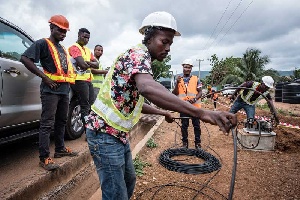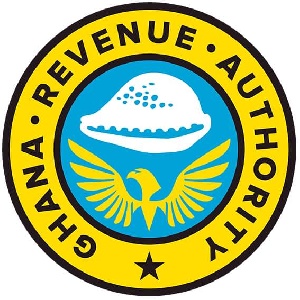- Home - News
- Elections 2024
- News Archive
- Crime & Punishment
- Politics
- Regional
- Editorial
- Health
- Ghanaians Abroad
- Tabloid
- Africa
- Religion
- Photo Archives
- Press Release
General News of Wednesday, 7 May 2025
Source: www.ghanawebbers.com
Ghana’s telecom sector suffers over 5,600 fibre cuts in 2024
Dr. Kenneth Ashigbey is the CEO of the Ghana Chamber of Telecommunications. He reported that Ghana had 5,600 fibre optic cable cuts in 2024.
These damages cost an estimated US$9.2 million, over GH¢138 million for the sector.
He spoke at the 24th Chamber of Telecommunications Knowledge Forum in Accra. The event was attended by the Director-General of the National Communications Authority (NCA) and telecom representatives.
The forum's theme was “Leveraging Fibre for Accelerated Development.” It also introduced a manual for Telecommunication Industry Optic Fibre Minimum Specifications and Standards.
This manual aims to guide fibre optic infrastructure deployment across Ghana.
Dr. Ashigbey highlighted the significant impact of these disruptions. The effects go beyond financial costs to telecommunications companies.
He noted losses in revenue, reputational damage, and extensive restoration efforts. These efforts totaled over 432 days in 2024.
The average cost per fibre cut is about US$23,000, according to Dr. Ashigbey. He expressed concern about repeated damage at the same locations, which delays repairs.
“This destruction affects telecom companies and small businesses,” he said. It also impacts banking services, emergency communication, and education delivery.
Road construction is the main cause of fibre cuts, accounting for 20.68 percent of total incidents. Other causes include theft and vandalism at 13.98 percent.
These issues often arise from misconceptions about copper in fibre cables or private developers' activities.
Dr. Ashigbey mentioned other contributing factors like broken ports, drain construction, fire, farming, flooding, and accidental damage by utility companies like Ghana Water and ECG.
He stressed that Ghana’s critical digital infrastructure is vulnerable and needs protection.
He acknowledged support from regulators like NCA and Cyber Security Authority but called for more collaboration with stakeholders.
This includes road agencies, utility companies, and local assemblies to protect telecommunications infrastructure during projects.
Key recommendations included relocating telecom data cables during new road constructions and enforcing excavation permits strictly.
Dr. Ashigbey urged decisive action against those deliberately damaging the network.
Funds spent on repairs could have expanded connectivity to underserved areas instead.
He appealed to stakeholders to prioritize protecting Ghana’s digital backbone.
He urged the Minister of Communication to champion legislation that consolidates existing laws for better protection of telecommunications infrastructure.
Additionally, he called on the Ministers for Interior and Attorney General to support this law's implementation.











